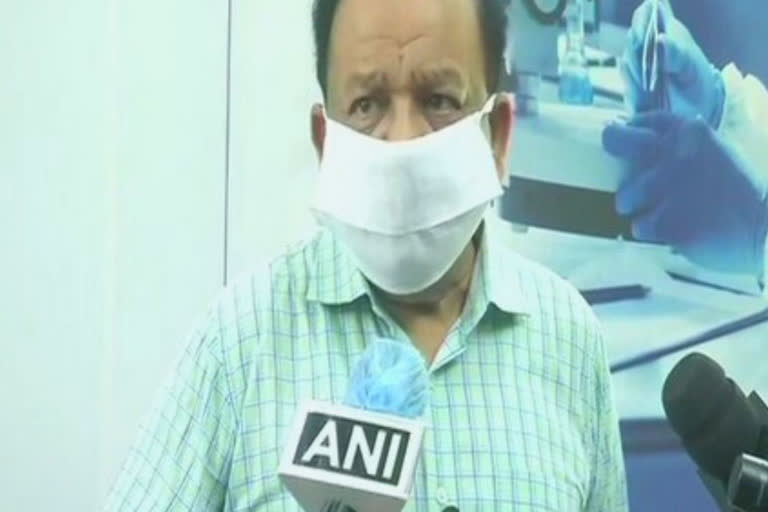New Delhi: Union Minister for Health and Family Welfare Dr Harsh Vardhan on Wednesday said that there has been commendable achievement on various parameters of tuberculosis (TB) control in India.
“Early accurate diagnosis followed by prompt appropriate treatment is vital for ending TB. The National TB Elimination Programme (NTEP) has expanded both the laboratory network as well as diagnostic facilities to cover the entire country.
To end TB by 2025, expansion of TB services and addressing determinants of TB that are beyond health, through a multi-sectoral approach is necessary. All these efforts are yielding significant results,” said Dr Vardhan while releasing the annual TB Report 2020 in New Delhi.
Dr Vardhan highlighted his government’s target of achieving the Sustainable Development Goal (SDGs) of eliminating TB in the country by 2025, five years ahead of the Global Target.
The TB Report 2020 has highlighted that around 24.04 Lakh TB patients have been notified in 2019. This amounts to a 14 per cent increase in TB notification as compared to the year 2018.
Similar to trends in the previous years, over half of the total notifications are contributed by the five states namely Uttar Pradesh (20 per cent), Maharashtra (9 per cent), Madhya Pradesh (8 per cent), Rajasthan (7 per cent) and Bihar (7 per cent).
Near-complete on-line notification of TB patients through the NIKSHAY system has also been achieved. “There was a reduction in the number of missing cases to 2.9 lakh cases as against more than 10 lakhs in 2017.
Private sector notifications increased by 35 per cent with 6.78 lakh TB patients notified,” the report said adding “Due to easy availability of molecular diagnostics, the proportion of children diagnosed with TB increased to 8 per cent in 2019 compared to 6 per cent in 2018,” the report said.
Provision of HIV testing for all notified TB patients increased from 67 per cent in 2018 to 81 per cent in 2019, the report added.
The increasing trend in case notification has continued, which has resulted in a drastic reduction in the quantum of missing cases. The programme has also successfully disbursed incentives through Direct Benefit Transfers (DBT) scheme totalling nearly 463 crores towards nutritional support.
Overall the age distribution of TB diagnosed incident cases shows a predominance in the adolescent and young adult age groups between 15 to 30, indicating ongoing disease transmission.
However, there is a wide variation in the age distribution patterns among the states. In southern states of Kerala, Karnataka, Tamil Nadu, Andhra Pradesh along with the UTs of Puducherry, Lakshadweep and Andaman and Nicobar, there is a general elderly prevalence of TB towards the age 50-year ranges.
However, in most of the other states, the incidence is similar to that of the country with predominance in the 15-30-year groups.
Moving towards a patient-centric approach for ending TB in the country, community empowerment has been institutionalized through the constitution of TB Forums in all the states and districts.
Over 90,000 TB survivors have been sensitized and more than 300 trained TB champions are now supporting close to 8000 TB patients.
“Expansion of treatment services has resulted in a 12 per cent improvement in the treatment success rate of notified patients. For 2019 it is 81 per cent compared to 69 per cent in 2018. More than 4.5 lakh DOT Centers provide treatment covering almost every village across the country,” the report further said.
Dr Vardhan, however, said, “We as a nation need to come together, to fight against TB and the stigma surrounding it so that every TB patient can seek care with dignity and without discrimination. The community must act as a wellspring of support and comfort for the patient.”
Significantly, in the categories of larger states with more than 50 lakh population, Gujarat, Andhra Pradesh and Himachal Pradesh were awarded as best performing States as far as the fight against TB is concerned.
In the category of smaller states with less than 50 lakh population, Tripura and Nagaland were awarded. In the category of Union Territory, Dadra and Nagar Haveli, and Daman & Diu were chosen as the best performers.
It may be mentioned here that efforts to end TB in India through the implementation of the National Strategic Plan (2017-2025) have completed three years of implementation.
Interestingly, some States and UTs have committed to ending TB even before 2025 - Kerala (2020), Himachal Pradesh (2021), Sikkim, Lakshadweep (2022) Chhattisgarh, Jammu & Kashmir, Madhya Pradesh, Tamil Nadu and Bihar, Jharkhand, Puducherry and Dadra Nagar Haveli & Daman Diu (2025).
Mapping of high-risk groups, carefully planned systematic screening and active case finding for active TB has improved early case detection leading to reduced risks of transmission, poor treatment outcomes and adverse social and economic consequences. This year, 27.74 crore population were screened across 337 districts in 23 States resulting in 62,958 TB cases identified.
Meanwhile, a joint monitoring mission for the revised national tuberculosis control programme along with World Health Organisation (WHO) has put a few recommends for the elimination of TB from India including mounting TB elimination campaign envisaged in India's NSP with clear accountability and multi-sectoral engagement, urgent reinforcements to the existing workforce, rapidly scale-up private provider engagement, move from passive community engagement to full community participation and ownership, invest in TB surveillance staff and systems for accurate.
The joint monitoring mission 2019 has also suggested complete, and timely information, deployment new precision diagnostic tools and ensure access to prompt, quality-assured testing for accelerated progress, support patients comprehensively throughout treatment, using a people-centred approach, re-design and pursue targeted active case, deployment and evaluate ambitious plans to implement TB preventive treatment, and investment in research to develop additional new tools required to end TB.
Also read:India, China holding diplomatic talks to ease border tension
